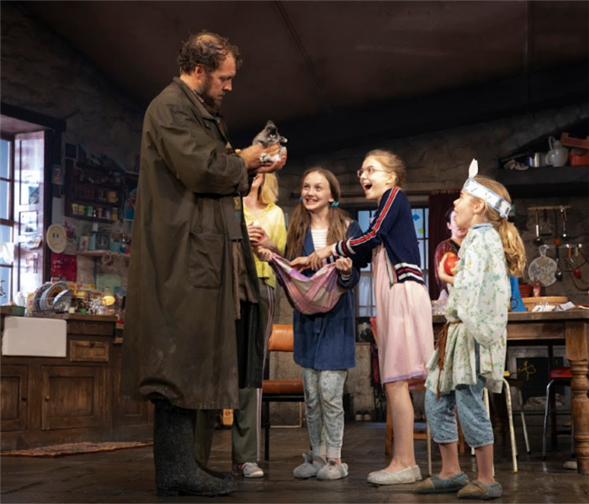Translate Page

Justin Edwards on the necessary realism of The Ferryman on Broadway
---
W.C. Fields famously quipped that actors should "never work with children or animals." Yet Justin Edwards is doing both in his Broadway debut in The Ferryman. Jez Butterworth's breathtaking, three-hour-plus epic focuses on an incredibly eventful day for the Carneys, an Irish farming family grappling with loss, love and political turmoil in 1981. Edwards' character, the sweet, sturdy and slow Tom Kettle, is the sole Englishman onstage and an unofficial part of their clan, having been taken in at age 12 decades earlier by the late patriarch. But in an era when the Troubles were ripping Ireland apart, not everyone in the household views this outsider kindly.
Best known in his native England for his work on TV sitcoms, Edwards jumped at the opportunity to join The Ferryman earlier this year when it was running in London, and he was thrilled when director Sam Mendes invited him to travel with the show to New York. "I'm very typecast, certainly in the U.K.," he says. "I sort of fell into comedy and then, once you become a comic actor, that's what you do. It's very difficult to break out of that. The chance to do this felt good. When I first read the script, I knew exactly who this person was. When I was growing up in a small village in England, there were men in their fifties who clearly had some sort of learning disabilities, but they were very good farm workers. And that's what they'd fall into, an outdoorsy kind of job where they were left to their own devices."
Because he feels like part of the family, Tom Kettle (who's always called by his full name) enjoys showing up with unexpected treats hidden in his coat to delight the Carney kids, from plump red apples to adorable baby bunnies. He also saves the harvest feast by capturing their escaped goose. Although Edwards had never worked with animals before, he didn't worry that they might upstage him. "The rabbits are incredibly docile," he says. "They sit in my pockets for quite a long time. The goose is incredibly sweet. The West End one was slightly more vicious, so it was always a little tricky getting her on. This one is incredibly domesticated. I keep her tucked under my arm. But if I didn't and her wings got out, I don't know what she'd do!"
{Image1}
That risk of the live animals running amok is part of the production's impressive commitment to verisimilitude. Even though the play is meticulously written and staged (with 22 characters including an actual infant, it has to be!), it feels like real life unfolding in front of the audience's eyes. You get the sense that anything could happen, which is fitting given the narrative's many surprises. "In the script it says: 'Tom Kettle enters with a live goose,'" Edwards says. "Other directors might think, okay, let's change that. Let's have someone say, 'I've just seen Tom with the goose,' and point offstage. But Sam said, 'Nope, we're going to have one.' It's an expensive choice. She's onstage for all of 90 seconds, but that's why the play is so good. It's full of that kind of detail and naturalism."
Edwards wanted to make sure his portrayal of Tom Kettle was equally authentic, so he worked hard to avoid stereotype. "I did worry about it during the rehearsal process," he says. "It's never explicitly said that he has a developmental disability, but there are clues, details that point toward autism or Asperger's. While he does have an emotional connection to people, he's at a distance from everyone. I was aware of the responsibility of playing someone like that."
For the first act and a half, Tom Kettle pops in and out, often in humorous moments. Even when he's on stage, he quickly shuffles out of the spotlight so he can wolf down the food the characters cook. "Everything on the set works so they're genuinely frying eggs -- I stand in the back and eat the lot," Edwards says. "As an actor you never turn down a free meal!" But late in the play, the character is involved in two pivotal moments that impact everyone.
While it takes a long, dense journey to get there, critics and audiences have been embracing this saga stateside, just as they did across the pond where it won four Oliviers including Best New Play. "I think Americans have taken to it very well," Edwards says, noting that theatregoers don't need an intimate knowledge of Irish history to understand the play. "It's a love story, not a documentary on the Troubles. Jez doesn't take any sides; he just presents this extraordinary family and their story to make of it what you will."
Raven Snook is the Editor of TDF Stages. Follow her at @RavenSnook. Follow TDF at @TDFNYC.
Top image: Justin Edwards, Carla Langley, Willow McCarthy, Brooklyn Shuck and Matilda Lawler in The Ferryman. Photos by Joan Marcus.
TDF MEMBERS: Go here to browse our latest discounts for dance, theatre, and concerts.